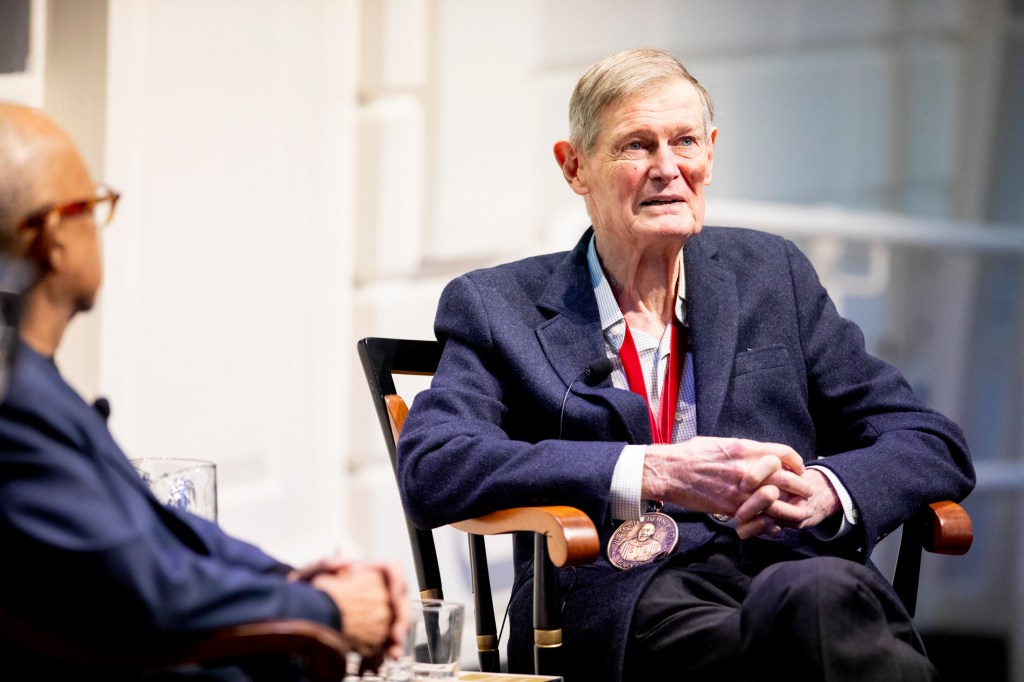SlaveVoyages, a groundbreaking tool for data on history’s largest slave trades, is getting a new home.
Word of the project’s upcoming move was shared recently by Henry Louis Gates Jr., the Alphonse Fletcher University Professor and director of the Hutchins Center for African & African American Research. “I’m pleased to tell you today that the SlaveVoyages site, with all of its databases, will live in perpetuity here at Harvard University,” Gates announced at a conference dedicated to celebrating the open-access resource.
SlaveVoyages was the result of nearly four decades of scholarly contributions, with researchers from multiple institutions working painstakingly to digitize handwritten records from archives worldwide.
Today, its multisource dataset, currently housed at Rice University, features information on more than 30,000 slaving vessels that traversed the Atlantic between the 16th and 19th centuries. Also documented are details on nearly 221,000 individuals involved with the trans-Atlantic slave trade, including ship captains and the humans they trafficked.
The project’s website, launched in 2008 at Emory University, brings data to life with rich visualizations. A time-lapse animation tracks each of the individual voyages on a map of the trans-Atlantic slave trade. A pair of 18th-century French slaving ships, both bound for present-day Haiti, have been recreated in 3D video based on surviving drawings.
As SlaveVoyages expanded, the Hutchins Center provided key funding along with the National Endowment for the Humanities, the Andrew W. Mellon Foundation, and Emory University. Stepping up to help support the project in its new home is the Harvard & the Legacy of Slavery Initiative (H&LS).
“Education is central to the mission of the initiative.”
Sara Bleich
“Education is central to the mission of the initiative,” said Sara Bleich, vice provost for special projects and the leader of H&LS. “SlaveVoyages’ databases build on the curiosity of Harvard students who catalyzed the University’s ongoing reckoning with its ties to slavery. By cofunding the project with the Hutchins Center, the initiative can help amplify knowledge-sharing and visibility, empower scholars and students worldwide, while also reaffirming our commitment to truth.”
The April 3-5 conference, hosted by the Hutchins Center, attracted researchers associated with the project as well as those it has inspired.
“This conference brings together generations of scholars who dedicated their lives to unearthing centuries of data to help us understand in detail and with nuance the contours of the slave trade — a quantifiably brutal trade in human beings that spanned oceans and continents while devastating millions of lives,” said Gates, who is also a member of the initiative’s Advisory Council.
Over three days, sessions covered a wide range of topics suggesting the global scope of the slave trade. The conference kicked off with a panel on the genetic impacts of the slave trade featuring David Reich of Harvard Medical School, Kasia Bryc of the Broad Institute, as well as scholars from Johns Hopkins University and the National Center of Medical Genetics of Cuba.
Rice University associate professor of history Daniel B. Domingues da Silva, who currently serves as host of the SlaveVoyages project, unpacked his findings on Brazil’s 19th-century slave trade. Jorge Felipe-Gonzalez, an assistant professor of history at University of Texas at San Antonio, discussed the potential integration of AI into the database. Jane Hooper, a professor of history at George Mason University, explored shipboard uprisings on Indian Ocean voyages.
A final panel addressed the South West Pacific trade, with Francis Bobongie-Harris, Queensland University of Technology educator and researcher emphasizing the human cost.

Gates opened one of the afternoon sessions with a surprise for SlaveVoyages originator David Eltis, an emeritus professor of history at Emory University and the University of British Columbia, bestowing on him the W.E.B. Du Bois Medal “in recognition of his unyielding vision that brought to life a resource that has transformed our understanding of one of the most cataclysmic and consequential economic, social, and cultural forces unleashed in the history of humanity.”
The medal is “especially fitting” for Eltis, Gates added, given the fact that Du Bois, the first Black American to earn a Ph.D. from Harvard University, wrote his 1895 dissertation on efforts to suppress the trade of enslaved Africans in the U.S.
Source link

